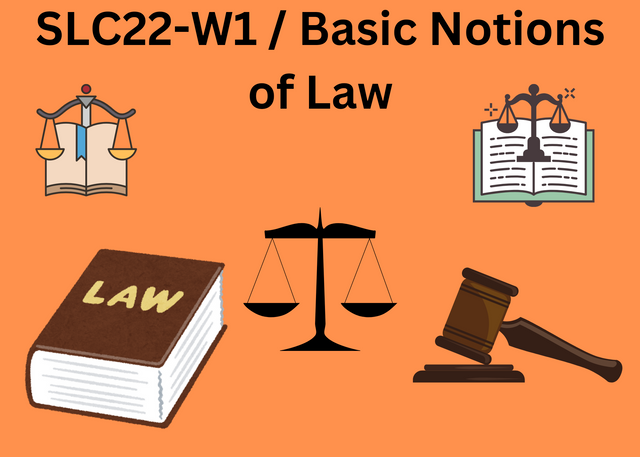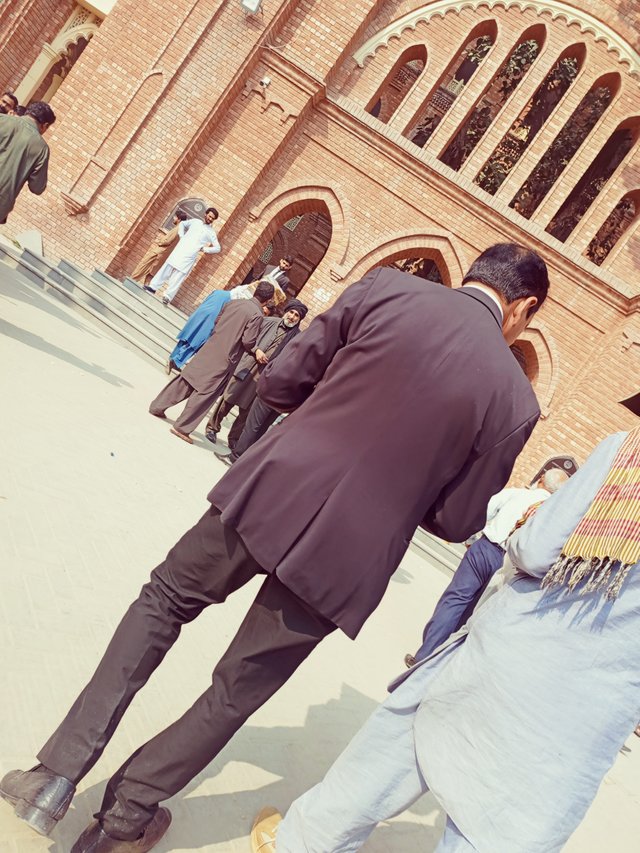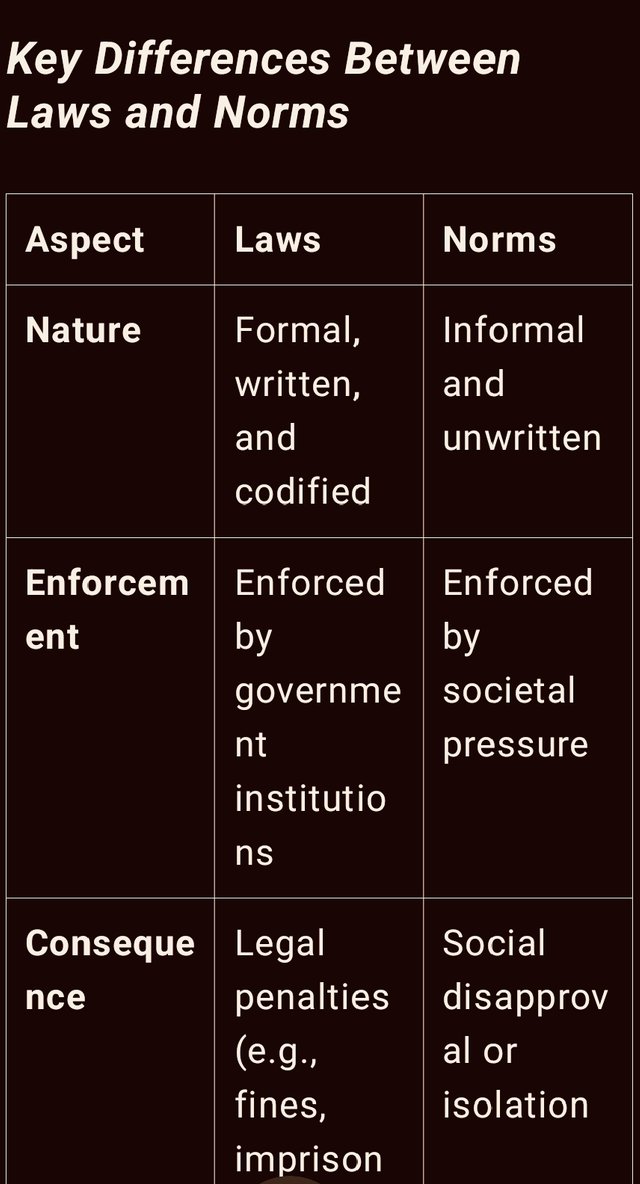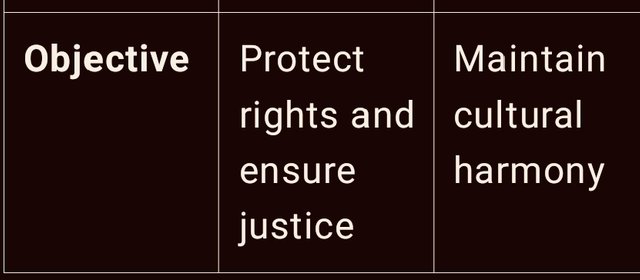SLC22-W1 / Basic Notions of Law
First of all I want to thank steemit blog for choosing the best teachers especially this teacher topic is very awesome and especially it shows us concepts related to law and no one in this matter. No doubt this topic is very important for us. I would like to especially thank the teacher whose name is.Teacher @anasuleidy & @elider11SLC22-W1 / Basic Notions of Law

made by canva

Q.1 - Say in your own words and based on what was explained in class: What is law?Considering the explanations given in class, according to the law and the laws of your country, I pointed out two examples of "Objective Law" and two examples of "Subjective Law".

The Rational of the Concept of Law
What is Law?
As a branch of knowledge it refers to a body of rules which are developed and put into practice by society or government to control the behavior of citizens. It is meant to foster structure, offer justice as well as guarantee the liberties and protection of the people in a society. The law provides for conflict regulation and defines measures in the case of violations for the proper functioning of society. It may be codified by Statutes, Regulations, Case Laws and Ocean or may take any other legal shape permissible under the law of a particular country.
In essence, law operates on two levels:
1. Objective Law: A body of regulations which govern all members’ relations in a society and which prescribes their rights and duties.
2. Subjective Law: The individual rights and privileges that are immanent in the objective law.
Examples of Objective Law
1. Chapter – XIII Criminal Law (Pakistan Penal Code – PPC)
As mentioned the Pakistan penal code, PPC defines criminal law in Pakistan as an example of objective law. Everyone is subject to it and determines what an offense - theft, murder, or fraud – and its penality entail. For instance, Section 302 of the PPC addresses the penal consequences for murder and puts the word out that people are not allowed to commit this crime.

2. Traffic Regulations
Other examples of objective type of knowledge are traffic laws such as speed bunkers or laws governing the use of highways. It is the laws that control the conduct of individuals on the roads for safety of all individuals. For instance, there are provisions of Penalty in Motor Vehicle Ordinance of Pakistan such as driving without license or not wearing seat belt etc consistently irrespective of the kind of rider or driver.
Examples of Subjective Law
1. Right to Education
Article 25-A of the Constitution of Pakistan also gives children of ages 5 to compulsory education right. This is an individual subjective right that allows persons seek and claim education from the state. Even though its application is grounded through the provision of objective law, the right can also be exercised personally by interested parties.
2. Property Ownership
Pakistan’s property laws such as the Transfer of property Act provides the individuals such subjective rights over the property. This right stems from the objective legal system but is subjective in How and is actionable if a person’s property rights are breached.
The concrete and the formal, as the feature of objective and subjective law show the functioning of the legal system to maintain regulation and an individual’s rights and freedoms. Statutes are Public and governed by state and federal government While and Equity laws are personal governed by court order. In this way the mentioned aspects guarantee legal justice, social equality, and responsibility between people.

Q.2 - Based on what you have explained in class, make a comparison and according to the law of your country. Give an example of a law and an example of a norm.

Distinction between law and Norm
Rules and regulations are the basic structural elements of societal architecture that control people’s behavior but have distinctive characteristics concerning their establishing, implementing, and aims. Both are used in order to ensure that things run smoothly and conflict is kept to a minimum; however their roles and functioning differ.
1. Laws
Legal requirements are structure manners that are approved by some sovereign authority like the state or a court of law. They are both written and documented, and ever y word carries a legal connotation and repercussions if infringed. Laws can be enforced by the police, court, and other people’s authorities.
Example of a Law
In Pakistan, rape is unlawful through Section 376 of the Pakistan Penal Code (PPC). This law states that a person charged with rape as a crime is subjected to severe penalties include imprisonment and or death penalty. This law is implemented by legal agencies hence responding to the needs of those who have been affected.
2. Norms
Norms are general habitual standards passed by the society, community, or culture, which have not been written down. Actually, they regulate people’s conduct according to their culture, norms, and ethics expected from a people. Norms are not the same as laws, in that they are not enforceable by law, and there are no consequences for not following them. Nevertheless, transgression of norms result to low acceptance in the society, rejection or even loss of prestige.
Example of a Norm


In Pakistani culture, people have peculiar culture of honoring their elders. Although there is no law compelling people to respect elder people, then failure in doing so attracts social criticism or even condemnation. For instance, should a young man use abusive language to an old woman in a public place, chances are high that very many people will scold or frown at the young man.
In comparison the primary distinctions: Laws and Norms
Interdependence
Laws and norms are not similar but they are related. Traditions are the source of laws in most cases. For example, while the taboo against interacting with people in-detination was norm against hurting others, it developed into laws against assault and murder. On the other hand, it is clear that laws can foster norms so that there are changes in public expectation over time.

If there is no law there is no order even as norms offer A guide to the norms of conduct in society. Legal frameworks for justice and order are contained in laws as compared to norms that create a social ethos from which everyone benefits. Comparing them and knowing how they blend enables people to observe social norms without violating lawful requirements.

Q.3 - Explain in your own words what importance Comparative Law has for you according to what you have seen in class.

This paper will seek to provide and explain why comparative law is essential.
Comparative law is a legal field of comparative jurisprudence in which laws of two or more countries are compared in an effort to know how they resemble or differ. In my view, this subject has a high impact on the responder for such reasons as: The subject responds to the gaps in the legal systems, increases one’s legal literacy, and contributes to legal developments. What I have gained from this class is a clearer understanding about the significance of comparative law in currently interlinked world.
The Relationship between Different Societies and Their Legal Framework
The first reason that comparative law is crucial is it helps to elucidate different systems of law. Some countries follow the common law, civil law, Islamic law, or even customary law among others.. Comparative law helps us understand how these systems deal with the very similar legal problems in different manner. For example, discussions of how contract law operates in the United States compared to Germany yielded the knowledge that even though both systems seek to sanction agreements, the ways they interpret and implement contracts are quite dissimilar. This understanding fosters respect between the individuals and enable the one with the knowledge to operate in two or more legal systems.
Facilitating Legal Reforms
Comparative law which means the comparison between the laws of different countries can be used as a legal tool used in introducing legal reforms. Lawmakers concerned with enhancement of their systems usually consider best practices in other legislators. For example, in class we looked at how countries such as Japan reinvented their legal system after the Second World War by borrowing from Western legal system . Internationalization of laws make it possible for countries to make reforms which have already impressed somewhere else and pass them without a lot of hitches.
Promoting Global Partnership
That is true given the current great interconnectivity of the countries of the world and their mutual dependence. This shows that comparative law enhances the cross legal system cooperation among counties by locating areas of legal similarities. This is especially the case in trade relations and cultural and humanitarian fields, such as human rights and environmental law. For instance, the deliberations on the role and place of international treaties and conventions described how comparative law assists in the synchronizing of the discordant legal frameworks that are then utilized to facilitate efficient functioning of international treaties.
This course: Improving Critical Thinking Skills
In my perspective, the study of comparative law has helped improve the kinds of questions that one can ask. Every legal theory involves the consideration of why certain systems, implement particular methods. It is a welcomed departure from rote memorization of legal norms, as one is forced to learn the culturally, historically, and politically construction of laws. Second, the comparative perspective that we developed in class has helped me to realize that there are never two right answers to a legal problem, but several, which correspond to different sets of axiological postulates.
Promoting Legal Innovation
There is one more advantage that should be mentioned – comparative law as an incentive to innovation. It is obvious that through comparative analysis of legal systems the jurists and scholars can see what options that are not applicable in their own system might be more effective. For instance, class discussions examined ways in which the non-western notion of restorative justice, which has its origins in native American and New Zealand indigenous cultures, has been adopted into the present day criminal justice systems. Still, this exchange and involvement make the work of all the legal systems in the world become more enriched.

To sum up, comparative law is not only a branch of juridical knowledge but a real and a necessary science in the modern conditions of the multiplied多少 It educates, advances legal change, enhances collaboration, and generates creativity. In this connection what I have acquired in the class has made me to have better understanding of the significance of comparing the legal systems. To me, it is a practice of rapport, reconciling and seeking joint decisions in a world that I seek to be more fair and balanced. This discipline emphasizes that the international community could acquire lots of benefits from learning the best practices from one another to enhance the legal system to be better across the globe.

i would like to invite @wilmer1988 @josepha @suboohi to take part in this contest
Note All Mine picture in the high court

The practical examples you've included make the post so relatable and engaging. It’s inspiring to see your passion for learning and teaching.
@max-pro dear bro thanks for your valuable comment
X Permotion Twitter
https://twitter.com/shabbir_saghar/status/1869419365525008658?t=ABJUMou4jXDYGDIF5PgtQg&s=19